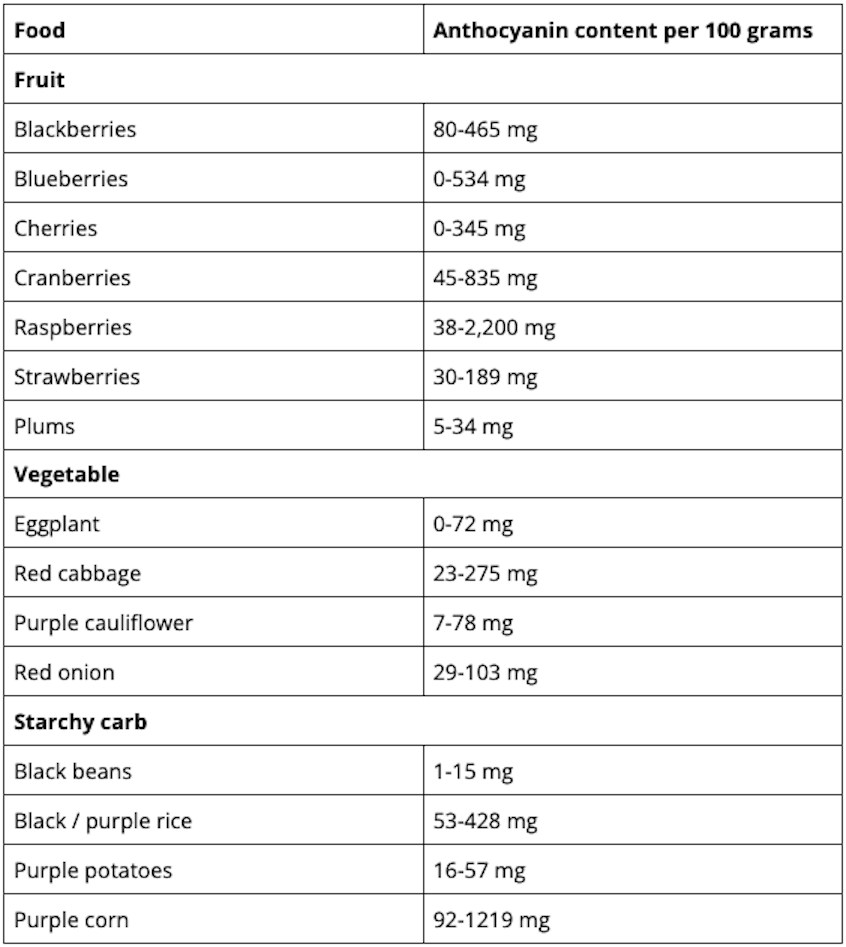Anthocyanins Explained: Benefits and Sources for Your Diet
Ever wondered about the secret superheroes of nutrition with less-than-appetising names? Enter anthocyanins, the focus of this exploration. Despite sounding more like industrial chemicals than natural pigments, anthocyanins are the compounds that give vibrant foods like blueberries and strawberries their eye-catching colours.
Anthocyanins belong to the flavonoid family, a group of plant-based chemicals that, despite their misleading name, aren’t biological weapons but rather essential molecules that support our health and longevity.
So, beyond their peculiar name, let’s dive into anthocyanins: what they are, where they’re found, and how they can help combat or alleviate metabolic disorders, as revealed by recent research.
Understanding Anthocyanins
Ever wondered how plants protect themselves from the sun’s harmful rays? Anthocyanins act as natural sunscreens, imparting rich red, blue, and purple hues to fruits and vegetables.
The highest concentrations of anthocyanins are found in raspberries, blackberries, cherries, plums, cranberries, pomegranates, and chokeberries. Blueberries and strawberries also boast significant anthocyanin content. Among vegetables, anthocyanins are abundant in eggplant, red cabbage, purple cauliflower, purple carrots, and beets. Starchy sources like purple corn, purple yams/sweet potatoes, purple potatoes, black beans, and red kidney beans are also excellent sources.
Health Benefits of Anthocyanins
According to recent findings, anthocyanins offer promising benefits in addressing metabolic syndrome—a combination of conditions including abdominal obesity, high blood pressure, high blood sugar, and abnormal blood lipids. Left untreated, these conditions can significantly increase the risk of heart disease and type 2 diabetes.
Research suggests that anthocyanins provide a range of cardiovascular and metabolic benefits, including:
- Prevention of arterial plaque formation
- Reduction in blood pressure
- Inhibition of blood clot formation
- Anti-inflammatory properties
- Increase in HDL (high-density lipoprotein) cholesterol levels
- Reduction in LDL (low-density lipoprotein) and total cholesterol levels
- Enhancement of antioxidant capacity
If these benefits sound appealing, here’s where you can find significant anthocyanin concentrations in your diet.

Why Do Anthocyanin Levels Vary?
Similar to humans, foods are products of their environment. Factors like growing conditions, harvest timing, and post-harvest handling can influence the nutrient content of fruits and vegetables. Additionally, the form of the food—whether whole, juiced, powdered, or processed—can affect anthocyanin levels.
Addressing Abdominal Fat
Excess visceral adipose tissue, which accumulates around internal organs, is a known risk factor for metabolic disorders. While animal studies suggest that anthocyanins may help reduce abdominal fat and overall body weight, evidence in humans remains inconclusive. However, observational studies indicate that increased consumption of anthocyanin-rich foods like blueberries and strawberries is associated with less weight gain over time among large study populations.
Key Takeaways
- Embrace a Diverse Diet: While anthocyanins offer significant nutritional benefits, remember that a balanced diet should include a variety of nutrient-dense foods, including colourful fruits and vegetables rich in anthocyanins.
- Exercise Caution with Supplements: Exercise Caution with Supplements: Unlike essential vitamins and minerals, anthocyanins do not have a recommended daily allowance (RDA) because deficiency is not a concern. While supplements and processed forms of anthocyanin-rich foods exist, whole foods are generally recommended for maximising health benefits. Moreover, when choosing supplements, partner with a supplement brand you can trust.
As research continues to uncover the potential health benefits of anthocyanins, incorporating these colourful nutrients into your diet can contribute to improved overall health and well-being.
If you have specific health concerns or need guidance on incorporating anthocyanin-rich foods into your diet, consider consulting with a nutritionist or healthcare provider. They can provide tailored advice based on your individual health needs and goals.
References:
What anthocyanins can do for metabolic health. Precision Nutrition.
Godyla-Jabłoński, Michaela, Ewa Raczkowska, Anna Jodkowska, Alicja Zofia Kucharska, Tomasz Sozański, and Monika Bronkowska. 2024. “Effects of Anthocyanins on Components of Metabolic Syndrome-A Review.” Nutrients 16 (8).
Manolescu, Bogdan Nicolae, Eliza Oprea, Magdalena Mititelu, Lavinia L. Ruta, and Ileana C. Farcasanu. 2019. “Dietary Anthocyanins and Stroke: A Review of Pharmacokinetic and Pharmacodynamic Studies.” Nutrients 11 (7).
Kristamtini, Kristamtini, and Endang Wisnu Wiranti. n.d. “Total Anthocyanin Content in 18 Black Rice Cultivars.” ResearchGate. Accessed June 13, 2024.
Bertoia, Monica L., Eric B. Rimm, Kenneth J. Mukamal, Frank B. Hu, Walter C. Willett, and Aedín Cassidy. 2016. “Dietary Flavonoid Intake and Weight Maintenance: Three Prospective Cohorts of 124,086 US Men and Women Followed for up to 24 Years.” BMJ 352 (January): i17.



